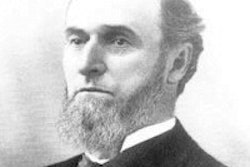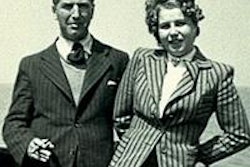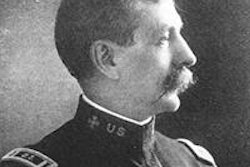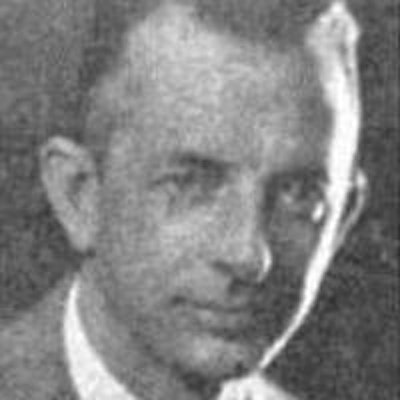
Bonnie and Clyde, Machine Gun Kelley, Baby Face Nelson, and Frank Dillinger -- all part of an era in American history when notorious bank robbers were more or less glorified by the nation's press. But there was really nothing to glorify about them. They were all stone-hearted killers.
It was in this social environment that Frank Hardy, DDS, "a sharpshooting, mild-mannered dentist," found himself on September 29, 1937, in Midland, MI.
Dr. Hardy was born in Midland in 1890, the second of three boys. His father was a lumberman. Dr. Hardy graduated from the University of Michigan School of Dentistry in 1912 with honors and married Laura, his childhood sweetheart. The couple had no children. He was a veteran of World War I and active in Midland social clubs. He practiced dentistry from 1913 until he died of pneumonia in 1947 at the age of 57.
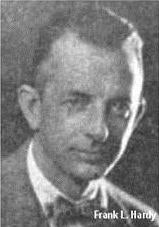 Frank Hardy, DDS.
Frank Hardy, DDS.
The story begins in 1932 when the sheriff of Midland County apprehended Ray Hamilton (age 19) and Jean O'Darr (age 22). The two men had gotten off a bus from Chicago to case and rob the Chemical State Savings Bank in Midland.
At the time, it was common knowledge that the bank received a $75,000 cash shipment ($1.3 million in 2014 dollars) every two weeks for the nearby Dow Chemical Plant payroll. At the time, most payrolls were disbursed in cash to workers.
Hamilton was a boyhood buddy of Clyde Barrow, and the pair was implicated in the murder of Oklahoma Deputy Sheriff Eugene Moore -- the first peace officer killed by the pair. Hamilton was subsequently arrested and extradited to Texas. According to Dave Rogers, a local historian in nearby Bay City, MI, Bonnie and Clyde "sprang Hamilton from a prison work gang in [January] 1934, and the trio set off on a cross-country crime spree."
In the process of "springing" Hamilton and four other inmates, Bonnie and Clyde killed a prison guard, causing Texas authorities to plan extraordinary actions for their demise. Bonnie and Clyde were mowed down five months later in May 1934 in Louisiana by Texas rangers. Their love affair, crime spree, and bloody ending were memorialized in the 1967 hit movie Bonnie and Clyde, starring Warren Beatty and Faye Dunaway.
Just before the pair was gunned down, Hamilton had split from the gang after a dispute over his girlfriend. Hamilton was apprehended and sent to the Texas State Penitentiary at Huntsville. He was sentenced to death and electrocuted a year later -- his last words being, "Well, goodbye all."
As a result of the Hamilton and O'Darr incident, the Midland County sheriff deputize several local businessmen in the "business district to thwart any [future] attempt to rob the bank," according to Margaret Leaming, author of an article about the bank robbery. One of those deputized was Dr. Frank Hardy, who was told to keep a loaded deer rifle in his office on the second floor of a mattress and furniture store next to the bank.
On September 29, 1937, two ex-cons, Jack Gracey (28) and Tony Chebatoris (37), walked onto the scene. The two men, who had met in prison, had spent several days casing the bank.
The duo entered the bank shortly before noon. According to Leaming, they entered the bank without anyone noticing, and Gracey walked over to the bank's president and shoved the muzzle of a shotgun into his ribs. The bank president "grappled with Gracey for the shotgun," she continued.
In the scuffle, Chebatoris shot the banker and a cashier. Realizing their plans "had gone awry," the bank robbers fled the bank, jumped into their getaway car, and sped off.
“Dr. Hardy, hearing the commotion, looked out his second story window and saw the fleeing robbers.”
Dr. Hardy, hearing the commotion, looked out his second story window and saw the fleeing robbers. According to Leaming, "He coolly poked a hole in the screen in the window, which had been raised in the September heat." Dr. Hardy, an avid hunter, had a keen eye. He took three shots at the fleeing automobile. One hit Chebatoris, who was driving, in the left arm, causing him to crash the car into a parked vehicle.
The two men started running -- all the while Dr. Hardy continued to fire. Chebatoris mistook a uniformed 50-year-old deliveryman by the name of Henry Porter for a policeman and shot him, thinking he was the one firing at him and Gracey. The two then commandeered a pickup truck. Chebatoris jumped into the passenger seat and held a gun on the driver as Gracey jumped on the running board. When the car sped off, Dr. Hardy took aim and shot Gracey in the head -- killing him instantly. Dr. Hardy told reporters that Gracey "turned a backflip like an acrobat when one of the .35s hit him. I knew he was done for."
The shooting caused the commandeered vehicle to slam into a guard rail, forcing the wounded Chebatoris to steal yet another car, which he backed into still another car when police apprehended him.
Both the banker and cashier survived their gunshot wounds, but the deliveryman died two weeks later.
In the usual scheme of things, the Midland incident would likely have faded away -- except for the subsequent conviction and execution of Chebatoris. Michigan, then as now, had no death penalty (in 1846, it was the first state to abolish the death penalty).
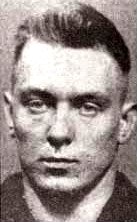 Tony Chebatoris.
Tony Chebatoris.
In 1934, Congress enacted the National Bank Robbery Act, which was designed to protect banks with federal deposits or federally insured deposits from the then-epidemic scourge of bank robberies gripping the nation. The law provided for the death penalty whenever a homicide occurred during the commission of a bank robbery. Chebatoris became the first person in the U.S. to be tried under the law for a homicide. Had Chebatoris been charged and convicted under state law, he would have received a life sentence and been eligible for parole after 14 years.
In October 1937, federal prosecutors secured a conviction, with the jury directing that Chebatoris be punished by death -- hanging. After his conviction, he muttered, "A lot of bull." While awaiting his execution, he tried to commit suicide by slashing his wrists and throat with a "rusty razor blade," but he was taken to the local hospital, where he recovered.
In prison, he studied atheism, "defaced holy pictures on the wall of his cell, and swore at nuns who came to visit him." As his hanging date approached and carpenters began building a gallows, the warden had another prisoner housed in his cell to "calm him." He refused his last meal.
Michigan officials, including the governor, sought to have the execution moved to another state. The governor appealed to President Franklin Roosevelt, who refused to change the site of the hanging.
Chebatoris was hanged on July 8, 1938, at the U.S. Detention Farm at Milan, MI. Not only was he the first to be executed under the federal law, he is also the only man executed in Michigan since 1846 -- a span now of 168 years.
In 1998, 60 years after the incident, the Saginaw News interviewed Gary Skory, executive director of the Midland Historical Society, and 85-year-old Henry Hardy, a cousin of Dr. Hardy. The two told the interviewer that Dr. Hardy became a town hero and later a national one. The local Army-Navy Club gave him a medal for marksmanship, and the city council bestowed a gold medal of honor on him. According to the Midland Daily News, the bank's insurance company gave Hardy $400 as a reward ($6,900 in 2014 dollars). In addition, FBI Director J. Edgar Hoover sent the sharpshooting dentist a special citation commending him for his actions.
Dr. Hardy's cousin Henry said, "It was not something that he was proud of ... and ... the family never discussed it."
Daniel Demers is a semiretired businessman whose hobby is researching and writing about 19th and 20th century historical events and personalities. He holds a bachelor's degree in history from George Washington University and a master's degree in business from Chapman University. You can review his other published works at www.danieldemers.com.
Sources
Newspapers
Dr. Frank Hardy is dead. Midland Daily News. June 11, 1947:1.
Leaming MA. An occurrence at Milan -- Michigan's last execution. Court Legacy. April 1994. Accessed January 25, 2014.
Rogers D. 1932 arrests in Bay City precipitated historic Midland bank robbery attempt. MyBayCity.com. December 10, 2006. Accessed January 25, 2014.
Websites
Anthony Chebatoris. Wikipedia website. https://en.wikipedia.org/wiki/Tony_Chebatoris. Accessed January 25, 2014.
Blanco JI. Anthony Chebatoris. Murderpedia website. https://murderpedia.org/male.C/c/chebatoris-anthony.htm. Accessed January 25, 2014.
Dow Chemical Company. Wikipedia website. https://en.wikipedia.org/wiki/Dow_Chemical_Company. Accessed January 27, 2014.
Raymond Hamilton. Wikipedia website. https://en.wikipedia.org/wiki/Raymond_Hamilton. Accessed January 25, 2014.
Email correspondence
Shannon O'Dell, director and curator, Sindecuse Museum of Dentistry, University of Michigan. January 26, 27, 2014.
Katherine Redwine, researcher, Midland Public Library. January 29, 30, 2014.




